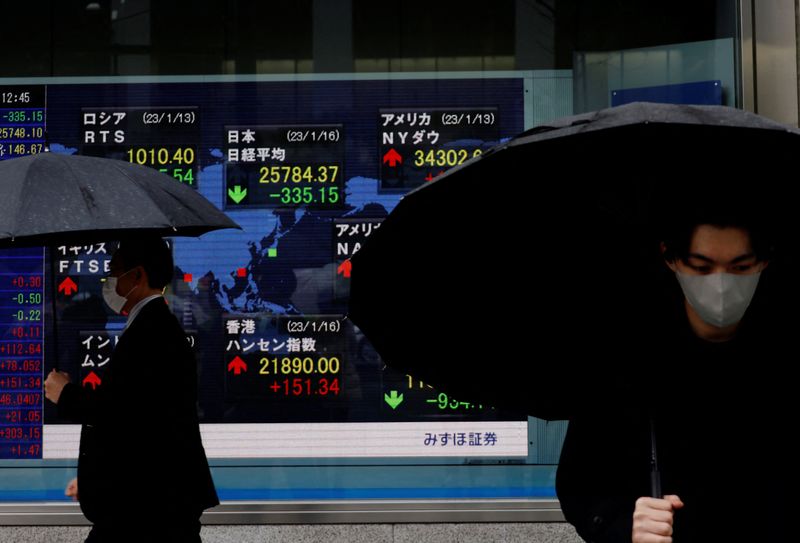By Naomi Rovnick, Marc Jones and Yoruk Bahceli
LONDON (Reuters) - From stocks to government bonds, markets have had one of their best starts to the year in decades but whether the run lasts depends on a Goldilocks scenario of inflation easing, economic growth holding up and borrowing costs falling.
After $14 trillion was wiped off world shares in 2022, $4 trillion has been added back this month. China's relaxation of COVID-19 restrictions has powered Hong Kong's Hang Seng Index to double-digit gains, while Europe's Stoxx 600 share index enjoyed its best start to the year on record.
Widespread optimism has rewarded investors who took a chance on buying a U.S. junk bond index with a total return of more than 5% this month. Electric car maker Tesla (NASDAQ:TSLA)'s shares have jumped 44%, copper prices have surged and the tech-dominated U.S. Nasdaq 100 has had its best January since the dotcom boom
At the other end of the spectrum, ultra-safe U.S. Treasuries and German Bunds have put in some of their strongest January performances since 2008, according to Datastream calculations. That followed tentative signs inflation has peaked and that central banks will soon pause rate hikes, with markets now pricing a just-right outcome of borrowing costs getting cheaper, while the world pulls back from the brink of recession.
January's metrics are significant because they reflect how investors have set their portfolios for the year ahead, although some reckon this month will mark no more than a spate of irrational complacency if rates do keep rising.
"Markets are in this Goldilocks-scenario of OK growth, slowing inflation and softer monetary policy," said Richard Dias, founder of London-based investment consultancy Acorn Macro. "I don't think it's going to last."
Graphic: Off to a great start https://www.reuters.com/graphics/GLOBAL-MARKETS/akpeqmgerpr/chart.png
ONE-WAY TICKET?
Fahad Kamal, chief investment officer at Kleinwort Hambros, cautioned that January's cross-asset rally mainly signaled that investors were re-adjusting after an overly gloomy 2022, when the global stock indexes dropped by a fifth and bond returns saw their worst year for decades.
"Equities were coming off a really challenging year, same with bonds," Kamal said. "Obviously there was some oversold sentiment and clearly we have had some better news."
The key risk? Inflation surprises, he added. "The market isn't capturing that. It thinks we are on a one-way ticket downwards."
U.S. consumer prices fell for the first time in more than 2-1/2 years in December, to 6.5%. Euro zone inflation has also slowed, although data on Monday showed Spain's consumer prices rose in January for the first time in six months.
China's reopening has lit up other buying signals worldwide, sparking rallies for the Thai baht, Brazilian real and Australian dollar. Emerging market debt issuance also had a record start to the year.
Europe's gas prices have helpfully plunged too, easing concern of a deep recession there. A downturn in U.S. business activity has also eased.
"I wouldn't say all green lights are flashing," said Michele Morganti, senior equity strategist at Generali (BIT:GASI) Investments, "but the outlook is fundamentally better than it was a few months ago".
Graphic: Global business activity perks up https://www.reuters.com/graphics/GLOBAL-ECONOMY/PMI/klpygzrxbpg/chart.png
GOLDILOCKS VS THE BEARS
Yet, the Goldilocks outlook of inflation and interest rates cooling off, while the global economy warms up a little, could be a fairytale, some investors say.
Major central banks have added almost 3,000 basis points to global borrowing costs in this tightening cycle to date.
And if they become less worried about recession and more determined to tamp inflation that remains vastly above target levels, "monetary policy will remain restrictive", Acorn's Dias said.
Artemis bond fund manager Juan Valenzuela warned that it was unlikely both low-risk government bonds and riskier assets, such as stocks and junk bonds, could continue rallying in tandem.

"We've had a monumental rally in government bonds based on expectations we've reached the peak in interest rates," he said.
"If global aggregate demand is much stronger [than expected] that will support inflation," he warned. "So, the two markets cannot be right."